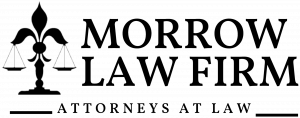Determining Legal Responsibility After a Company Vehicle Collision in Louisiana
In many cases, if an employee is operating a company vehicle during the course of employment and causes an accident, liability may extend to the employer under Louisiana’s respondeat superior doctrine”
OPELOUSAS, LA, UNITED STATES, August 7, 2025 /EINPresswire.com/ -- When an accident involves a company-owned vehicle, the legal questions surrounding liability can quickly become complex. In Louisiana, fault determination may extend beyond the individual behind the wheel, involving the employer, third parties, insurance carriers, and in some cases, the vehicle’s manufacturer or maintenance provider. The legal framework that governs these cases draws from both personal injury law and employment law, creating a multifaceted environment that requires careful navigation.— William P. Morrow
Accidents involving commercial vehicles often include delivery trucks, vans used by service workers, construction vehicles, and fleet cars. The party held responsible for damages may vary depending on several factors: whether the driver was on duty, the nature of the task being performed, whether negligence can be proven, and the driver’s classification as an employee or independent contractor.
William P. Morrow, an attorney at Morrow Law Firm in Opelousas, Louisiana, explains how the law applies in these situations. “In many cases, if an employee is operating a company vehicle during the course of employment and causes an accident, liability may extend to the employer under Louisiana’s respondeat superior doctrine,” said Morrow. “This legal principle holds an employer accountable for the actions of an employee acting within the scope of their job.”
However, that accountability is not automatic. Legal disputes often arise around whether the driver was truly acting within the scope of employment. For example, if a delivery driver detours to run a personal errand and causes a collision, the employer may not be held liable. Each case must be evaluated on its own facts to determine how closely the driver’s actions align with assigned work responsibilities.
Additionally, some companies classify their drivers as independent contractors, which can shift liability away from the employer. Courts may analyze the degree of control the company had over the individual’s actions, including supervision, scheduling, and the provision of equipment. If a contractor is truly independent under Louisiana law, legal responsibility may fall solely on the individual operating the vehicle.
In collisions involving work-related transport, other layers of liability may surface. If a crash was caused or worsened by mechanical failure—such as faulty brakes, steering issues, or tire blowouts—then maintenance providers or vehicle manufacturers may also be included in legal proceedings. Establishing liability in these instances often requires expert mechanical inspection and an extensive review of maintenance records.
William P. Morrow notes that the legal focus in such cases must be comprehensive. “The goal is to identify every contributing factor—human, mechanical, procedural—and evaluate the roles of each party involved,” he said. “In company vehicle collisions, that evaluation typically goes far beyond the individual behind the wheel.”
Insurance coverage also plays a critical role. Most Louisiana companies carry commercial auto insurance policies, which differ from standard individual policies in both structure and limits. These policies may cover employee negligence, but not intentional misconduct or unauthorized use of a company vehicle. Coverage disputes often emerge in the early stages of a case, requiring timely investigation and careful interpretation of policy language.
Injured parties seeking compensation after being struck by a company vehicle must also be aware of the legal timeline. Louisiana enforces a two-year prescriptive period for personal injury claims, meaning that a formal lawsuit must be filed within two years of the incident. Failure to meet this deadline can result in a permanent loss of the right to seek recovery, regardless of the severity of the injury.
Cases involving pedestrian injuries, cyclists, or motorists hit by commercial vehicles may require accident reconstruction, traffic camera footage, cell phone records, and witness statements to determine fault. These elements can help clarify whether the driver was distracted, under the influence, speeding, or violating company policy.
When work-related driving is involved, coordination with the employer’s HR department, insurance provider, and safety officer may be necessary to obtain relevant internal documents such as driver logs, training history, and incident reports. These records can prove vital in understanding both the behavior of the driver and the safety culture of the company.
In some circumstances, state or federal regulatory violations may come into play. Commercial drivers are subject to regulations that limit hours behind the wheel, require vehicle inspections, and mandate drug testing. Violations of these rules can support a broader legal claim against an employer, particularly if systemic negligence is uncovered.
Morrow Law Firm, led by attorneys William P. Morrow, John Michael Morrow, Jr., and Stephen M. Morrow, routinely handles legal matters involving injury, liability, and workplace-related transportation incidents. Their legal work reflects a consistent focus on accident investigation, regulatory compliance, and multi-party liability in Louisiana courts.
Company vehicle collisions can raise serious legal issues involving responsibility, compensation, and long-term impact. For those navigating this process in the aftermath of an accident, understanding the layered structure of liability is an essential first step. Each collision requires its own review—what vehicle was involved, who was driving, what policies were in place, and whether safety standards were met.
These legal matters don’t exist in isolation. They intersect with questions of employment classification, insurance obligations, mechanical integrity, and operational oversight. The outcome of such cases depends on the strength of evidence, the clarity of the facts, and the application of Louisiana law to the specific scenario at hand.
Morgan Thomas
Rhino Digital, LLC
+1 504-875-5036
email us here
Visit us on social media:
Facebook
Legal Disclaimer:
EIN Presswire provides this news content "as is" without warranty of any kind. We do not accept any responsibility or liability for the accuracy, content, images, videos, licenses, completeness, legality, or reliability of the information contained in this article. If you have any complaints or copyright issues related to this article, kindly contact the author above.


